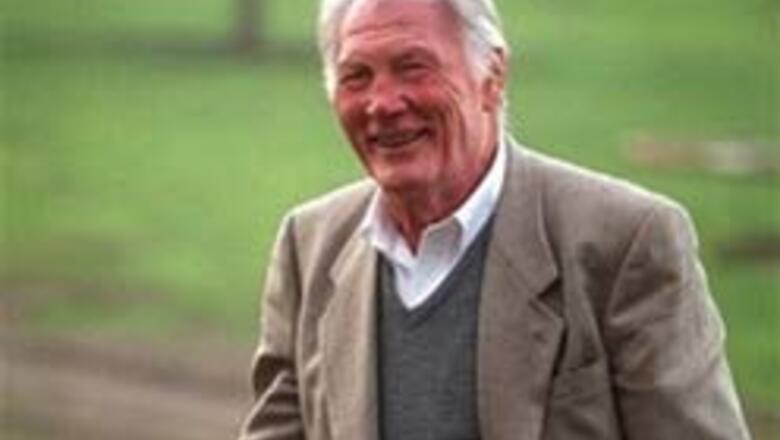
views
Los Angeles: Jack Palance, the craggy-faced menace in Shane, Sudden Fear and other films who turned successfully to comedy in his 70s with his Oscar-winning self-parody in City Slickers, died on Friday.
Palance died of natural causes at his home in Montecito, California, surrounded by family, said spokesman Dick Guttman. He was 87.
When Palance accepted his Oscar for best supporting actor he delighted viewers of the 1992 Academy Awards by dropping to the stage and performing one-armed push-ups to demonstrate his physical prowess.
"That's nothing, really," he said slyly. "As far as two-handed push-ups, you can do that all night, and it doesn't make a difference whether she's there or not."
That year's Oscar host, Billy Crystal, turned the moment into a running joke, making increasingly outlandish remarks about Palance's accomplishments throughout the show.
"I am deeply shocked and saddened by the loss of my dear friend Jack Palance, a true movie icon," Crystal said in a statement on Friday. "Winning the Oscar for that movie and the one-arm push-ups he did on the show will link us together forever, and for that I am grateful," he said.
The push-ups not only created a magic Oscar moment, but also epitomized the actor's 40 years in films. Always the iconoclast, Palance had scorned most of his movie roles.
Movie audiences though, were electrified by the actor's chiseled face, hulking presence and the calm, low voice that made his screen presence all the more intimidating.
His film debut came in 1950, playing a murderer named Blackie in Panic in the Streets.
After a war picture, Halls of Montezuma, he portrayed the ardent lover who stalks the terrified Joan Crawford in 1952's Sudden Fear. The role earned him his first Academy Award nomination for supporting actor.
Other prominent films included Kiss of Fire, The Big Knife, I Died a Thousand Deaths, Attack! The Lonely Man and House of Numbers.
Weary of being typecast, Palance moved with his wife and three young children to Lausanne, Switzerland, at the height of his career.
He spent six years abroad but returned home complaining that his European film roles were "the same kind of roles I left Hollywood because of."
His career failed to regain momentum upon his return, and his later films included The Professionals, The Desperadoes, Monte Walsh, Chato's Land and Oklahoma Crude.
PAGE_BREAK
He also appeared frequently on television, winning an Emmy in 1957 for his portrayal of an end-of-the-line boxer in Requiem for a Heavyweight.
Through most of his career, Palance maintained his distance from the Hollywood scene. In the late 1960s he bought a sprawling cattle and horse ranch north of Los Angeles. He also owned a bean farm near his home town of Lattimer, Pa.
A strapping six-feet-four and 210 pounds, Palance excelled at sports and won a football scholarship to the University of North Carolina. He left after two years, disgusted by commercialization of the sport.
He decided to use his size and strength as a prizefighter, but after two hapless years that resulted in little more than a broken nose that would serve him well as a screen villain, he joined the Army Air Corps in 1942.
A year later he was discharged after his B-24 lost power on takeoff and he was knocked unconscious.
The GI Bill of Rights provided Palance's tuition at Stanford University, where he studied journalism. But the drama club lured him, and he appeared in 10 comedies. Just before graduation he left school to try acting professionally in New York.
"I had always wanted to express myself through words," he said in a 1957 interview. "But I always thought I was too big to be an actor. I could see myself knocking over tables. I thought acting was for little guys," he added.
He made his Broadway debut in a comedy, The Big Two, in which he had but one line, spoken in Russian, a language his parents spoke at home.
The play lasted only a few weeks and he supported himself as a short-order cook, waiter, lifeguard and hot dog seller between other small roles in the theater.
His career breakthrough came when he was chosen as Anthony Quinn's understudy in the road company of A Streetcar Named Desire, then replaced Marlon Brando in the Stanley Kowalski role on Broadway.
Born Walter Jack Palahnuik in Pennsylvania coal country on Feb. 18, 1919, Palance was the third of five children of Ukrainian immigrants. His father worked the mines for 39 years until he died of black lung disease in 1955.
In addition to his daughter, Palance is survived by his second wife, Elaine Rogers Palance; another daughter, Brook Palance Wilding; grandchildren Lily and Spencer Spottiswoode and Tarquin Wilding; his brother, John Palance, and sister Anne Despiva.




















Comments
0 comment